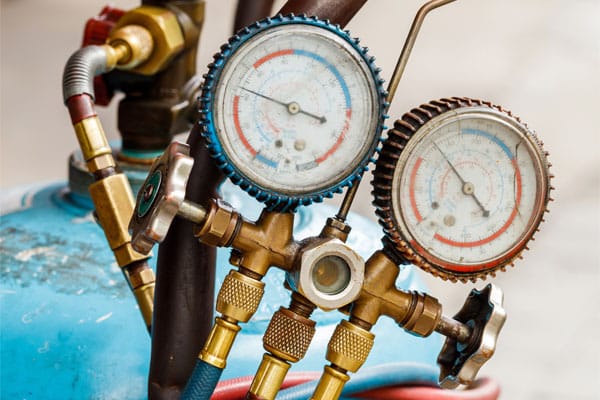When it comes to heating your home, there are several options available, but two of the most common choices are propane and natural gas. Both of these fuels have their advantages and disadvantages, and it’s important to weigh them carefully before making a decision. In this blog post, we’ll take a close look at the differences between propane and natural gas as home heating options, including how they are used and the potential pros and cons of each. Additionally, we’ll discuss the importance of seeking professional HVAC guidance to ensure that you make the best choice for your specific needs and circumstances.
Breaking Down Propane and Natural Gas – What Are They?
Propane and natural gas are two popular options for heating homes, but what exactly are they? Propane, also known as liquefied petroleum gas (LPG), is a byproduct of natural gas processing and petroleum refining. It is stored and transported as a compressed liquid and then converted to gas when used for heating. On the other hand, natural gas is a fossil fuel that is extracted from the ground. It primarily consists of methane and is piped directly to homes for heating purposes.
Both propane and natural gas are used in HVAC systems to provide warmth during the colder months. Propane heating systems typically use a propane furnace, while natural gas heating systems utilize a natural gas furnace or boiler. These systems work by burning the respective fuel to generate heat, which is then distributed throughout the home.
When it comes to the pros and cons, propane has some unique advantages. It is a versatile fuel that can be used not only for heating but also for cooking, water heating, and even fueling certain appliances like fireplaces and clothes dryers. Propane is also readily available in rural areas where natural gas infrastructure may be limited. However, propane is typically more expensive than natural gas, and the cost can vary depending on market conditions.
Natural gas, on the other hand, is often more cost-effective and readily available in urban areas. It produces fewer emissions compared to propane and is considered a cleaner-burning fuel. However, natural gas is a non-renewable resource and its extraction and transportation can have environmental impacts.
Understanding the Pros and Cons of Propane as a Home Heating Option
When it comes to choosing a home heating option, propane has its fair share of pros and cons. Let’s start with the positives.
One of the biggest advantages of propane heating is its versatility. Not only can it be used for heating your home, but it can also power other appliances like stoves, water heaters, and even fireplaces. This makes propane a convenient and multi-purpose fuel source.
Another benefit of propane heating is that it is readily available in rural areas where natural gas infrastructure may be limited. This is a huge advantage for those living in remote locations who may not have access to other fuel options. Propane can be delivered and stored in large tanks, ensuring a continuous supply of fuel throughout the colder months.
However, there are a few drawbacks to consider as well. One of the main downsides of propane is its cost. Propane tends to be more expensive than natural gas, and the price can fluctuate depending on market conditions. This means that heating your home with propane can potentially lead to higher utility bills.
Additionally, propane heating systems require regular maintenance to ensure their efficient and safe operation. This includes regular inspections and occasional tank refills. It’s also important to keep in mind that propane is a flammable fuel, so proper precautions need to be taken to ensure the safety of your home.
Overall, propane heating can be a viable option for many homeowners, especially those in rural areas. It offers versatility and convenience, but it’s important to consider the cost and maintenance requirements before making a decision. Professional HVAC guidance from Sherlock Air can help you weigh the pros and cons of propane heating and determine if it’s the right choice for your home.
Scrutinizing the Pros and Cons of Natural Gas as a Home Heating Option
When it comes to natural gas as a home heating option, there are several considerations to keep in mind. On the plus side, natural gas heating systems have gained popularity for their cost-effectiveness. Natural gas tends to be cheaper than propane, which can lead to lower utility bills for homeowners. This affordability makes it an attractive option for many families looking to save on heating expenses.
Another advantage of natural gas heating is that it is environmentally friendly. Natural gas produces fewer emissions compared to propane, making it a cleaner-burning fuel. This can be a significant factor for those concerned about their carbon footprint and looking for a more sustainable heating option.
However, there are a few drawbacks to keep in mind. One limitation of natural gas heating is its availability. While it is readily accessible in urban areas with established infrastructure, it may not be as easily accessible in rural areas. This can limit the options for homeowners in remote locations.
Additionally, natural gas HVAC systems require professional installation and regular maintenance to ensure their efficient and safe operation. This includes inspections and occasional repairs or replacements. It’s important to consider the cost and time commitment associated with maintaining a natural gas heating system.
Analyzing the Differences in Cost Between Heating with Propane and Natural Gas
When it comes to heating your home, the cost is a significant factor to consider. Analyzing the differences in cost between propane and natural gas can help you make an informed decision.
Propane and natural gas have different pricing structures. Propane tends to be more expensive than natural gas. The cost of propane can fluctuate depending on market conditions, making it less predictable compared to natural gas. On the other hand, natural gas is often more cost-effective and readily available in urban areas with established infrastructure.
The cost of the fuel itself is not the only aspect to consider. It’s essential to take into account the cost of installing and maintaining the heating system as well. Propane HVAC systems require regular maintenance and occasional tank refills, adding to the overall cost. Natural gas HVAC systems also require professional installation and regular maintenance, which may come with a higher initial investment.
To determine the cost difference between propane and natural gas, it’s important to consider factors such as fuel consumption, energy efficiency, and local utility rates. Consulting with a professional HVAC technician can provide you with accurate cost estimates and help you weigh the pros and cons of each option based on your specific circumstances.
In summary, while propane may be more expensive than natural gas, it’s crucial to consider the overall cost, including installation and maintenance expenses. The HVAC pros at Sherlock Air can assist you in analyzing the differences in cost and finding the most cost-effective heating option for your home.
Delving Into the Importance of Professional HVAC Guidance
When it comes to making a decision about heating your home, it’s important to have all the facts and guidance from a professional HVAC technician from Sherlock Air. While propane and natural gas each have their pros and cons, it can be challenging to determine which option is best for your specific needs and circumstances.
Seeking professional HVAC guidance is crucial because these experts have the knowledge and experience to evaluate your home’s heating requirements accurately. They can assess factors such as insulation, square footage, and regional climate to determine the most suitable heating system for you.
A Sherlock Air HVAC technician can also guide you through the pros and cons of propane and natural gas HVAC systems. They will ensure you have a clear understanding of the potential benefits, such as its versatility and convenience. They can also discuss any drawbacks, such as the cost and maintenance requirements.
With their expertise, HVAC technicians can also provide valuable insights into the cost difference between propane and natural gas. They can help you understand how fuel consumption, energy efficiency, and local utility rates impact your overall expenses.
Ultimately, professional HVAC guidance is invaluable in making an informed decision about propane versus natural gas for heating your home. These experts can provide personalized recommendations, ensuring that you choose the option that meets your comfort, budget, and environmental needs. So, don’t hesitate to consult with the HVAC professionals at Sherlock Air to make the best choice for your home.
Whether you require installation, repair, or maintenance, our technicians will assist you with top-quality service at any time of the day or night. Take comfort in knowing your indoor air quality is the best it can be with MOE heating & cooling services Ontario's solution for heating, air conditioning, and ventilation that’s cooler than the rest.
Contact us to schedule a visit. Our qualified team of technicians, are always ready to help you and guide you for heating and cooling issues. Weather you want to replace an old furnace or install a brand new air conditioner, we are here to help you. Our main office is at Kitchener but we can service most of Ontario's cities
Source link



